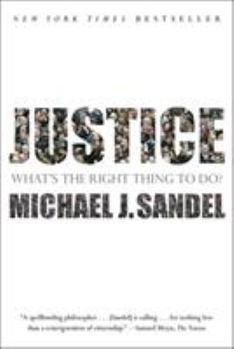Justice
Select Format
Select Condition 
Book Overview
A renowned Harvard professor's brilliant, sweeping, inspiring account of the role of justice in our society--and of the moral dilemmas we face as citizens
Format:Paperback
Language:English
ISBN:0374532508
ISBN13:9780374532505
Release Date:August 2010
Publisher:Farrar, Straus and Giroux
Length:320 Pages
Weight:0.67 lbs.
Dimensions:0.9" x 5.4" x 8.2"
Customer Reviews
4 ratings
Great course, great book, super audio
Published by Thriftbooks.com User , 14 years ago
Michael Sandel's book is a solid rendering of the on-line PBS course. A superb alternate experience is the audio-book, which captures the warmth and humor and interactive intelligence of Professor Sandel's class. On-line college instructors could gain much from watching the series, imagining the potential for video portrayals in addition to the usual textual discourse seen in on-line instruction. Likewise, listening to the exchanges between professor and student in the audio-book format provides an excellent introduction to Sandel's dialogic style. Top quality, truly worthwhile.
Dangerous Philosophical Thinking
Published by Thriftbooks.com User , 15 years ago
Michael Sandel is a political philosopher, Harvard professor and perhaps National Treasure. His concern is achieving a just society and introducing notions about virtue and moral reflection into political debates. His philosophy lectures merited a 12-part TV series on PBS, but something quite serious seems to be in the works. Forget about the tedium of philosophy classes - memorizing arguments of great philosophers and reproducing them in exams. This is different. If Sandel continues to gain access to the country through the national media, he might do for us what Socrates did for the ancient Greeks. He might succeed in making moral reflection a public endeavor, not a solitary activity. To him, a philosopher can be an interlocutor for the people. He and his students (disciples?) might shame our politicians into doing the right thing more often. Justice, read by the author, starts out in a friendly manner with its first case being the price gouging for necessities in the aftermath of Hurricane Charlie. At the time, newspapers were filled with editorials on how price gouging is not wrong since there's no "just price" and supply and demand should be allowed free reign. Yet buyers in emergencies are under duress and thus not truly free. That's why we feel a sense of outrage. We learn that we share principles tracing back to famous dead philosophers. By the middle of this audiobook, Sandel cuts close to the bone and you can see now why politicians would like to confine him to the lecture hall. He shows us that justice is inescapably judgmental and that today's political arguments are about anything but virtue. He wants philosophy to be used on economics, not just on matters of abortion and gay marriage. Sandel demonstrates that the growing inequality in the U.S. undermines the solidarity that a democracy requires. Sandel points to the hollowing out of the public realm on which a democratic society depends. As public services decline and decline, as we let our common spaces for all but wealthy Americans deteriorate, we undermine our shared democratic citizenship. Common spaces accessible by our democracy include public transportation, parks, schools, hospitals and health clinics, libraries, the news media and more. Much of the rest of public life has become overly market-based. We privatize prisons and contemplate a system of monetary rewards for teachers whose students achieve higher scores on state assessments. We've allowed a terrific gap in military service with a smaller percentage of our public officials having children in the military and serving in the wars than ever before. We load heavy burdens onto families of our troops without mercy. We gave tax cuts to the rich in time of war and were advised to go shopping. In all this, Sandel explains the schools of philosophical thought that provided the principles we adopted. Sandel contrasts ancient theories of justice, concerned with virtue, with modern theories concerned with freedom. Y
Stellar, diverse collection of essays on conceptions of justice
Published by Thriftbooks.com User , 16 years ago
This collection gathers together a wide array of classic writings on the topic of justice -- justice as fairness (Rawls), justice as a framework for the protection of rights (Locke, Rawls, Mill), justice from a teleological perspective (Aristotle), justice as the grounding for a conception of categorical morality (Kant), and justice as a defense to the results of the market system (Nozick). This is an indispensible set of readings for anyone grappling with the foundational questions of how we should live as individuals, nations, and a species.
Hard to get through
Published by Thriftbooks.com User , 16 years ago
First off I got this book for a class, I didn't choose it of my own accord. I don't think I have the brain power or attention span to get through this book just 'on the side'. There are a lot of interesting pieces in here. I've read Aristotle go on about the home and the economy, and John Locke talk about rights and property. The content of this book is great, and I think the arrangement of the pieces into columns makes it easier to read. The only thing I complain about is some sloppiness. I'm not sure if it's the translation (which, in Aristotle's case, puts sentences into confusing order), or the editor, but there are some grammar mistakes. Not a whole lot, just enough that I was annoyed. All in all, if you can digest this type of thing OK, this is a fine collection.





